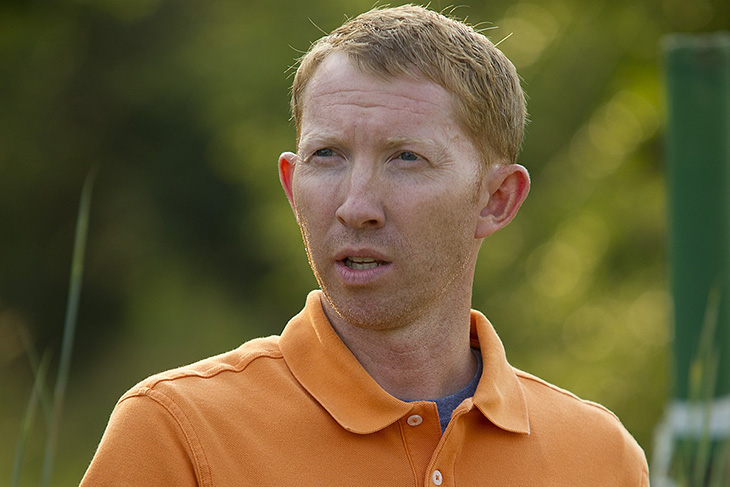
OSU’s Dwayne Elmore honored as 2018 Whatley Award recipient
Friday, September 28, 2018
Oklahoma State University’s Dwayne Elmore has been named the 2018 recipient of the James A. Whatley Award for Meritorious Service in Agricultural Sciences.
The award was initiated in 1982 and is presented annually by OSU’s Division of Agricultural Sciences and Natural Resources in recognition of outstanding career contributions that command regional, national and international respect.
Elmore currently serves as a natural resource ecology and management professor and holder of the OSU Irvin Bollenbach Endowed Chair in Wildlife Management. An OSU faculty member since June of 2006, Elmore has earned renown in scientific circles and amongst Oklahoma landowners and policy makers as an OSU Cooperative Extension wildlife specialist and a researcher focused on upland gamebird management and fire ecology.
“His ability to seamlessly bridge the gap between research and extension has played a major role in changing land-use practices on more than 200,000 acres in Osage County alone, directly benefiting both imperiled wildlife and cattle production,” said Craig Davis, NREM professor and Elmore’s fellow holder of an OSU Irvin Bollenbach Endowed Chair in Wildlife Management.
Davis also pointed out Elmore’s efforts to enlighten ranchers, other landowners, and civic and government officials and organizations about the economic and environmental costs of eastern redcedar encroachment.
“Dr. Elmore is a premier example of a modern land-grant scholar and professor because of his ability to develop fundable and exciting research questions and still maintain a connection to the practical questions asked by the general public,” said Sam Fuhlendorf, OSU Regents professor and holder of the Groendyke Chair in Wildlife Management.
Fuhlendorf cited Elmore’s work being referenced around the world and his being published in high-tiered international journals at a frequency surpassing that of most faculty whose positions are designed to provide for much-higher research capacity.
“He is well suited for the Whatley honor because his research program has been developed to serve the people of Oklahoma first yet still contribute to the larger scientific community,” Fuhlendorf said.
Davis agreed, saying “it is truly remarkable that he has developed such a strong presence as a researcher given his 25 percent research appointment.” To date, Elmore and his collaborators have accrued more than $5 million in research funding from a variety of sources including USDA’s Agriculture and Food Research Initiative, Joint Fire Science Program, Oklahoma Department of Wildlife Conservation and U.S. Department of Defense.
“Several of these funding sources were from nationally competitive programs, which is an indication of the quality of the proposals and importance of the research,” Davis said.
That has come as no surprise to Larkin Powell, professor of conservation biology and animal ecology at the University of Nebraska-Lincoln, who said his own work has benefited from Elmore’s ability to embody what he calls “a complete scientist.” In fact, Powell has classified Elmore’s published work on the dichotomy of public and private land conservation to be required reading for wildlife conservation undergraduates in his classes.
“Dr. Elmore’s work suggests areas within Conservation Reserve Program fields are better for a given avian species because of temperature refuges,” Powell said. “We recently modeled an investigation into temperature gradients and their use by nesting sharp-tailed grouse in Nebraska based on Dwayne’s publications.”
Christian Hagen of Oregon State University’s department of fisheries and wildlife said the thermal landscape research performed by Elmore and his Oklahoma State collaborators “has begun to change how we see, measure and think about conserving landscapes.”
Hagen added he has spent time with Elmore in Iceland, France, New Mexico and Oregon, witnessing firsthand that “Dwayne is the consummate biologist and mentor to students.”
“Dwayne has been brought on as a committee member to my Ph.D. student and as an adjunct to [our department] at Oregon State,” Hagen said. “He has made significant contributions to the advancement of agricultural science; in particular, his work on linking agricultural practices to sustainable wildlife and other natural resource issues.”
Elmore’s professional affiliations include the Society for Range Management, The Wildlife Society and the Association for Fire Ecology.
Elmore earned his bachelor’s degree in wildlife biology from the University of Tennessee at Martin in 1997, his master’s degree in wildlife and fisheries science from Mississippi State University in 2002 and his doctoral degree in wildlife biology from Utah State University in 2006.
The Oklahoma Cooperative Extension Service, in which Elmore has his major appointment, is one of two state agencies administered by DASNR, and is a key part of OSU’s state and federally mandated teaching, research and Extension land-grant mission.
